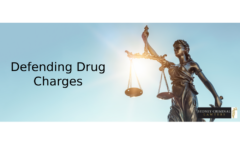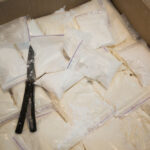Defending Drug Charges: Putting the Prosecution to Proof and Raising Available Defences

If you have been charged with a drug offence, it is vital to be aware that each of these offences contains several ‘essential elements’ (or ingredients) which the prosecution must prove beyond reasonable doubt – the prosecution will fail if the prosecution is unable to prove any of those ingredients to the required standard.
It is also important to know there are a number of general legal defences that apply to all drug offences, which include the defences of duress and necessity. Where evidence of such a defence is raised on the evidence, the onus then shifts to the prosecution to disprove beyond reasonable doubt that the defence applies in the circumstances.
And in addition to this, many drug offences have specific legal defences built into the legislation that contains the offence, and these can also be relied upon to beat a drug charge.
And on top of all of this, the courts have made decisions – known as ‘case law’ – which prescribe onerous requirements on the prosecution when it comes to proving the required ‘mental elements’ (states of mind) as well as physical acts necessary for a person who is accused of a drug offence to be found guilty.
Clearly, the laws relating to drug offences are complex and it is crucial to engage a specialist criminal defence law firm (rather than a firm that spreads itself over a range of areas) which is vastly experienced in defending and winning serious drug cases.
All of that said, here’s a short explanation of the essential elements of some of the most frequently-charged drug offences, as well as the legal defences that apply.
Which illicit drugs are subject to criminal penalties?
The lists of drugs that are subject to criminal penalties are contained in the legislation that creates the offence.
In the context of New South Wales, the main pieces of legislation containing drug offences are the Crimes Act 1900 (NSW) (which applies to conduct in New South Wales) and the Criminal Code Act 1995 (Cth) (which applies across Australia).
Some of the most commonly-prosecuted illegal drugs are:
- Heroin and other opioids.
- Methamphetamine and other amphetamines.
- Cannabis.
- Cocaine.
- LSD.
- Ecstasy (MDMA).
Defending against drug possession charges
Drug possession is a minor criminal offence, but has the potential to result in serious criminal penalties.
Drug possession refers to have a prohibited drug under your ‘exclusive possession, custody or control’.
The offence of drug possession in NSW
Possessing a prohibited drug is an offence under section 10 of the Drug Misuse and Trafficking Act 1985(NSW).
This offence will apply if a person is found in possession of any quantity of a prohibtied drug. The maximum penalty for drug possession is 2 years imprisonment and/or a fine of $2,200.
Police may choose to issue an on-the-spot fine rather than prosecute the matter in court. If this is the case, the may issue a $400 fine.
A person will be in ‘possession’ of an prohibited drug if:
- An illegal drug was in their ‘custody’ or ‘control’, and
- The person knew that they had custody or control of a prohibited drug.
To establish “possession”, the prosecution does not need to prove you knew the exact quantity or type of illicit drugs in your possession, but does need to prove beyond a reasonable doubt you had knowledge that a prohibited drug was in your possession, custody or control.
Defending against drug possession charges
Defending against a drug possession offence would require establishing that either you:
- Did not have prohibited drug under your exclusive possession, custody or control; or
- Did not know that you had custody or control of a prohibited drug at the times of the offence.
In addition a number of general legal defences may also apply, depending on the circumstances of the case. These defences include duress, necessity and self-defence.
There may also be an option to defend against charges if the evidence sought to be used by the prosecution was obtained illegally or improperly, or is not admissible due to the laws of evidence.
Defending against drug importation / exportation charges
Being charged with an offence related to drug importation / exportation is a serious matter, potentially carrying serious penalties including imprisonment.
Offences related to importation/exportation are outlined under the Federal Criminal Code and apply to the movement of “border controlled drugs” across national borders. A “border controlled drug” includes most illicit drugs including cannabis, cocaine, heroin, methamphetamine and ecstasy.
The offence of drug importation/exportation
Federal offences are divided on the basis of the quantity of the drug imported. These include:
- Importing or exporting a border controlled drug under section 307.3 of the Criminal Code Act 1995 (Cth) which carries a maximum penalty of 10 years imprisonment.
- Importing or exporting marketable quantities of a border controlled drug under section 307.2 of the Criminal Code Act 1995 (Cth) which carries a maximum penalty of 25 years imprisonment.
- Importing or exporting commercial quantities of a border controlled drug under section 307.1 of the Criminal Code Act 1995 (Cth) which carries a maximum penalty of life imprisonment.
For these offences, the prosecution must prove beyond reasonable doubt that:
- A person intentionally imported or exported a substance.
- The substance was a border controlled drug or plant at the relevant quantity for the offence (below marketable quantity or marketable quantity or commercial quantity), and
- The person knew or were reckless as to whether the substance was a border controlled drug or plant
Marketable quantities of common illicit drugs include:
- For cannabis, more than 25 kilograms but less than 100 kilograms.
- For ecstasy, more than half a gram but less than 500 grams.
- For cocaine, more than 2 grams but less than 2 kilograms.
- For amphetamines (including methamphetamine), more than 2 grams but less than 750 grams.
- For heroin, more than 2 grams but less than 1.5 kilograms.
A commercial quantity is an amount above the marketable quantity noted above.
An intention to import or export a substance under the Code requires that the person mean to engage in the conduct of importation or exportation, understands the circumstances (that a substance is present) and intends to bring about the importation or exportation of a substance.
Absolute liability applies to the quality and quantity of a border controlled drug imported or exported. This means a person cannot claim that they intended to import or export a different quantity of a border controlled drug or a different kind of border controlled drug or plant.
Recklessness as to whether the substance was a border controlled drug or plant, requires that the person understood that there was a substantial risk the substance was a border controlled drug and it was unjustifiable to take that risk.
Defending against drug importation/exportation charges
Defending against a drug importation/exportation offence would require establishing that either you:
- Did not intend to import or export the substances; or
- Did not know, and were not reckless to, whether the substance possessed was a border controlled drug.
In addition a number of general legal defences may also apply, depending on the circumstances of the case. These defences include duress, necessity and self-defence.
There may also be an option to defend against charges if the evidence sought to be used by the prosecution was obtained illegally or improperly, or is not admissible due to the laws of evidence.
Defending against drug supply charges
Being charged with an offence related to drug supply could potentially result in serious criminal penalties including imprisonment.
The offence of drug supply in NSW
Section 25(1) of the Drug Misuse and Trafficking Act 1985 outlines the offence of supply of a prohibited drug.
Drug supply can include supplying drugs to friends without payment, sending drugs in the post, and being part of a group of people buying drugs with combined funds, selling them and splitting the proceeds. Even if a drug that you supply doesn’t contain an illicit substance, if you have represented it as an illegal drug you can still be charged and convicted of drug supply.
To prove the offence of supply , the prosecution must prove beyond reasonable doubt that a person supplied drugs to another and knew, or believed at the time, the substance supplied was prohibited drug.
The maximum penalties which apply to supply offences depend on the quantity of the prohibited drug supplied:
- For less than a small quantity, a $5,500 fine and/or 2 years imprisonment if the matter is heard in the Local Court or a $220,000 fine and/or 15 years imprisonment if the matter is heard in the District Court.
- For more than a small quantity, but less than an indictable quantity, a $11,000 fine and/or 2 years imprisonment if the matter is heard in the Local Court or a $220,000 fine and/or 15 years imprisonment if the matter is heard in the District Court.
- For more than an indictable quantity, but less than a commercial quantity, a $11,000 fine and/or 2 years imprisonment if the matter is heard in the Local Court or a $220,000 fine and/or 15 years imprisonment if the matter is heard in the District Court.
- For more than a commercial quantity, but less than a large commercial quantity, a $385,000 fine and/or 20 years imprisonment.
- For more than a large commercial quantity a $550,000 fine and/or life imprisonment.
It should be noted that under section 29 of the Act, a charge of drug supply can be bought even if there is no evidence of a person actually supplying the drug.
This is known as ‘deemed supply’ and applies if a person is in possession of at least a ‘traffickable’ quantity of a drug.
A “traffickable quantity” is:
- 300 grams or 5 plants for cannabis.
- 3 grams for cocaine.
- 3 grams for heroin.
- 3 grams for methamphetamine (“ice”).
- 3 grams for ecstasy.
To rebut a charge of deemed supply, the accused must establish (on the balance of probabilities) that the drugs were possessed for reasons other than supply.
Defending against drug supply charges
Defending against a drug supply offence would require establishing that either you:
- Did not supply a prohibited drug to another; or
- Did not know the what was being supplied was a prohibited drug; or
- In cases of deemed supply, either that a you did not possess a traffickable quantity or that the drugs were possessed for reasons other than supply.
In addition a number of general legal defences may also apply, depending on the circumstances of the case. These defences include duress, necessity and self-defence.
There may also be an option to defend against charges if the evidence sought to be used by the prosecution was obtained illegally or improperly, or is not admissible due to the laws of evidence.
Defending against cannabis cultivation charges
Being charged with cultivating a prohibited plant (including cannabis or poppy plants) could constitute a serious criminal offence, carrying the risk of imprisonment.
Cultivation includes sowing or scattering seeds of, or planting, growing, tending, nurturing or harvesting prohibited plants
The offence of drug cultivation in NSW
Several offences relating to the cultivating of prohibited plans are found under the Drug Misuse and Trafficking Act 1985 NSW). These include:
- Cultivating or supply of a prohibited plant under section 23(1) of the Act.
- Cultivating a prohibited plant less than a commercial quantity by enhanced indoor means and for a commercial purpose under section 23(1A) of the Act.
- Cultivating more than a commercial quantity of a prohibited plant by enhanced indoor means under section 23(2) of the Act
- Cultivating a prohibited plant by enhanced indoor means in the presence of children under section 23A(1) of the Act.
- Cultivating a commercial quantity of a prohibited plant by enhanced indoor means in the presence of children under section 23A(2) of the Act.
- Cultivating a prohibited plant by enhanced indoor means for a commercial purpose in the presence of children under section 23(A)(3) of the Act.
A prohibited plant will be cultivated ‘for a commercial purpose’ if it is cultivated with the intention of selling it or any of its products; or with the belief that another person intends to sell it or any of its products.
An ‘enhanced indoor means’ is where cultivation occurs within a building or structure, and involves any of the following:
- The nurture of the plant in nutrient-enriched water (with or without mechanical support),
- The application of an artificial source of light or heat, and/or
- Suspending the plant’s roots and spraying them with nutrient solution.
A commercial quantity of cannabis is:
- 50 plants for cannabis cultivated via enhanced indoor means.
- 250 plants in any other case.
A large commercial quantity of cannabis is:
- 200 plants for cannabis cultivated via enhanced indoor means.
- 1000 plants in any other case.
The maximum penalties for cultivation offences depend on the quantity of cannabis cultivated .
For the offences under section 23 of the Act, the maximum penalties are:
- 10 years imprisonment and/or a $220,000 fine if the cannabis cultivated is less than a commercial quantity.
- 15 years imprisonment and/or a $385,000 fine if the cannabis cultivated is more than a commercial quantity but less than a large commercial quantity.
- 20 years imprisonment and/or a $550,000 fine if the cannabis cultivated is more than a large commercial quantity.
For the offences under section 23A(1) and section 23A(2) of the Act, the maximum penalties are:
- 12 years imprisonment and/or a $264,000 fine if the cannabis cultivated is less than a commercial quantity.
- 18 years imprisonment and/or a $462,000 fine if the cannabis cultivated is more than a commercial quantity but less than a large commercial quantity.
- 25 years imprisonment and/or a $660,000 fine if the cannabis cultivated is more than a large commercial quantity.
For the offence under section 23A(3) of the Act, the maximum penalties are:
- 18 years imprisonment and/or a $462,000 fine if the cannabis cultivated is less than a commercial quantity.
- 18 years imprisonment and/or a $462,000 fine if the cannabis cultivated is more than a commercial quantity but less than a large commercial quantity.
- 25 years imprisonment and/or a $660,000 fine if the cannabis cultivated is more than a large commercial quantity.
Lesser penalties apply if the offence is capable of being tied summarily.
Defending against cannabis cultivation charges
Defending against a cannabis cultivation offence would require establishing that either you:
- Did not cultivate cannabis or another prohibited plant; or
- Did not know the what was being cultivated was cannabis or another prohibited plant.
In addition a number of general legal defences may also apply, depending on the circumstances of the case. These defences include duress, necessity and self-defence.
There may also be an option to defend against charges if the evidence sought to be used by the prosecution was obtained illegally or improperly, or is not admissible due to the laws of evidence.
Defending against drug manufacturing charges
Being charged with an offence related to drug manufacture could potentially result in serious criminal penalties including imprisonment.
To ‘manufacture’ a drugs means to to make up, prepare, produce, process (including by extracting or refining), package or label the psychoactive substance.
The offence of drug manufacture in NSW
Several offences relating to the manufacture and production of prohibited drugs are found under the Drug Misuse and Trafficking Act 1985 NSW. These include:
- Manufacturing or producing or knowingly taking part in the manufacture or production of a prohibited drug under section 24(1) of the Act.
- Taking part in the activities above whilst exposing a child to the manufacturing or production process, or to substances being stored for use in the manufacturing or production process under section 24(1A) of the Act.
- Manufacturing or producing or knowingly taking part in the manufacture or production of a prohibited drug which is more than the commercial quantity under section 24(2) of the Act.
- Taking part in the activities above whilst exposing a child to the manufacturing or production process, or to substances being stored for use in the manufacturing or production process under section 24(2A) of the Act.
The maximum penalties for manufacture and production offences depend on the quantity of drug manufactured of produced .
For an offence under section 24(1) of the Act, the maximum penalty is 10 years imprisonment and/or a $220,000 fine.
For an offence under section 24(2) of the Act, the maximum penalty is:
- 15 years imprisonment and/or a $385,000 fine if the drug is more than a commercial quantity but less than a large commercial quantity.
- 20 years imprisonment and/or a $550,000 fine if the drug is more than a large commercial quantity.
For an offence under section 24(1) of the Act, the maximum penalty is 12 years imprisonment and/or a $264,000 fine.
For the offence under section 24(2A) of the Act, the maximum penalty is:
- 18 years imprisonment and/or a $462,000 fine if the drug is more than a commercial quantity but less than a large commercial quantity.
- 25 years imprisonment and/or a $660,000 fine if the drug is more than a large commercial quantity.
Lesser penalties apply if the offence is capable of being tried summarily.
Defending against drug manufacture charges
Defending against a drug manufacture offence would require establishing that either you:
- Did not manufacture a prohibited drug; or
- Did not know the what was being manufactured was a prohibited drug; or
- For offences involving children, did not endanger the child’s health or safety.
Defending against drug premises charges
Drug premises offences in New South Wales are contained in the Drug Misuse and Trafficking Act 1985.
Section 36TA of the Act defines ‘drug premises’ as any premises that are used for:
- the unlawful supply or manufacture of prohibited drugs; and/or
- the unlawful commercial cultivation of prohibited plants by enhanced indoor means.
Section 36U makes clear the term ‘prohibited drugs’ does not include does not include cannabis leaf, cannabis oil or cannabis resin.
However, the term ‘commercial cultivation’ refers to the cultivation of prohibited plants (including cannabis) which are:
- Over a commercial quantity (which for cannabis plants is 100 kilograms of dried leaf); or
- Over a small quantity (which for cannabis plants is 30 grams of dried cannabis leaf) where the plants or their products are intended by any person for sale.
Offences relating to occupying, allowing or organising drug premises in NSW
A variety offences related drug premises are outlined under the Act.
Section 36X of the Act outlines the offence of entering, or being on, drug premise. This offence carries a maximum penalty of:
- A fine of $5,500 or imprisonment for 12 months (or both) for a first offence; or
- A fine of $55,000 or imprisonment for 5 years (or both) for a second or subsequent offence.
Section 36Y(1) of the Act outlines an offence if a person, who is an owner or occupier of any premises, knowingly allows the premises to be used as drug premises. This offence carries a maximum penalty of:
- A fine of $5,500 or imprisonment for 12 months (or both) for a first offence; or
- A fine of $55,000 or imprisonment for 5 years (or both) for a second or subsequent offence.
Section 36Y(2) of the Act also outlines an offence if an owner or occupier of a premises knowingly allows the premises to be used as drug premises, and knows that a child has access to the premises and, as a consequence of that access, the child is exposed to:
- a prohibited drug or prohibited plant, or
- a drug supply process, or
- any equipment capable of being used to administer a prohibited drug.
This offence carries a maximum penalty of:
- A fine of $6,600 or imprisonment for 14 months (or both) for a first offence; or
- A fine of $66,000 or imprisonment for 6 years (or both) for a second or subsequent offence.
For the offences above, section 36ZB notes that a corporation will be said to have ‘known’ premises were being used as drug premises if there is evidence that an officer, employee or agent of a corporation (while acting in his or her capacity as such) had, at any particular time sufficient knowledge.
Section 36Z(1) of the Act outlines an offence if a person organises or conducts, or assists in organising or conducting, any drug premises. This offence carries a maximum penalty of:
- A fine of $5,500 or imprisonment for 12 months (or both) for a first offence; or
- A fine of $55,000 or imprisonment for 5 years (or both) for a second or subsequent offence.
Section 36Z(2) of the Act also outlines an offence if a person organises or conducts, or assists in organising or conducting, any drug premises, and knows that a child has access to the premises and, as a consequence of that access, the child is exposed to:
- a prohibited drug or prohibited plant, or
- a drug supply process, or
- any equipment capable of being used to administer a prohibited drug.
This offence carries a maximum penalty of:
- A fine of $6,600 or imprisonment for 14 months (or both) for a first offence; or
- A fine of $66,000 or imprisonment for 6 years (or both) for a second or subsequent offence.
Defending against drug premises charges
Defending against a drug premises offence would require establishing that either you:
- Did not know or couldn’t reasonably be expected to have known that premises were a drug premises; or
- For offences involving children, did not endanger the child’s health or safety.
In addition a number of general legal defences may also apply, depending on the circumstances of the case. These defences include duress, necessity and self-defence.
There may also be an option to defend against charges if the evidence sought to be used by the prosecution was obtained illegally or improperly, or is not admissible due to the laws of evidence.
Going to court over an drug matter?
If you are you going to court over a drug-related offence, call Sydney Criminal Lawyers anytime on 9261 8881 to arrange a free first conference during which one of our experienced defence lawyers will assess the case, advise you of your options and the best way forward, and fight for the optimal outcome.
Receive all of our articles weekly
Related Articles
RELATED LEGISLATION
- Section 307.1 Criminal Code Act 1995 | Importing or Exporting A Commercial Quantity of Border Controlled Drugs
- Section 307.2 Criminal Code Act 1995 | Importing or Exporting a Marketable Quantity of Border Controlled Drugs
- Section 307.3 Criminal Code Act 1995 | Importing or Exporting Border Controlled Drugs
- Section 23 Drug Misuse and Trafficking Act 1985 | Cultivating, Supplying or Possessing Prohibited Plants
- Section 25 Drug Misuse and Trafficking Act 1985 | Drug Supply
- Section 24 Drug Misuse and Trafficking Act 1985 | Drug Manufacture or Production
- Section 10 Drug Misuse and Trafficking Act 1985 | Drug Possession






